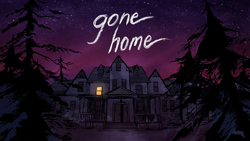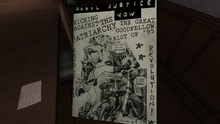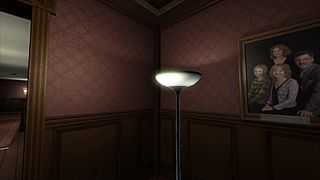Gone Home
| Gone Home | |
|---|---|
 | |
| Developer(s) | Fullbright |
| Designer(s) | Steve Gaynor |
| Composer(s) | Chris Remo |
| Engine | Unity[1] |
| Platform(s) |
|
| Release date(s) | Windows, Mac, Linux
|
| Genre(s) | Adventure, interactive fiction, point and click |
| Mode(s) | Single-player |
Gone Home is a first-person interactive story adventure video game developed and published by Fullbright.[2]
Set in the year 1995, the plot focuses on exploration of a mansion in Portland, Oregon, and examining common household objects within the home.[2][3]
Gameplay
The player takes the role of Kaitlin in the first-person view, who can view objects in the game using the mouse and move using the keyboard.

There are no set goals in the game, however the game encourages and rewards the player when they explore new areas of the house and search for new messages. Much of the interactivity rests upon looking at objects within the house. The player finds objects which open other areas of the house that contain other objects to be looked at.
Plot

On June 7, 1995, 21-year-old Kaitlin Greenbriar returns home — a mansion in Arbor Hill, Oregon willed to Kaitlin's father by his uncle — not long after midnight on a stormy night after a yearlong trip abroad. She spots a note on the door from her sister, Samantha, telling her to not go looking for answers as to where she is. As she enters the house, Kaitlin realizes nobody is home, not even her parents, so she investigates the house to find out where they all are. Players guide Kaitlin through this process, learning some things known to Kaitlin along with new facts about her family and their experiences over the past year. Through a series of the letters written to Kaitlin in Samantha's journal over the year Kaitlin was away, the player learns that Samantha and her family moved to the large house. Samantha then went to her new school and was eventually recognized as "The Psycho House Girl" after a man named Oscar Masan, who the player discovers is Samantha and Kaitlin's great uncle, left everything after his death to her father, even the house. During her first few weeks at school, Samantha spotted a girl in senior year, sometimes dressed in an army uniform. Unfortunately, Samantha never really had any chance to speak to her. Samantha once had a friend named Daniel, who was her neighbor before they moved, and Samantha explains she was only his friend for his Nintendo games, but realizes she really should call him at some point about it.
Samantha eventually gets to talk to the girl in the army uniform; she's named Yolanda "Lonnie" DeSoto, and she's always wanted to see "the Psycho House", so Samantha obliges and invites her to come over the next day. Samantha really feels like she's made a friend with whom she can feel normal. They share activities over the months, such as hair dyeing and watching Pulp Fiction. They eventually begin to form a strong relationship, with Lonnie telling Samantha that she looks beautiful. After seeing a Halloween show in "the city", they stay overnight at a friend's brother's house, and sleep together on a futon. The lights go out, and Lonnie puts her arm around Samantha and tells her she likes her. Samantha feels the same way but cannot bring herself to say anything afterwards. A few days later, Lonnie visits Samantha in her home, but it's an odd encounter. Lonnie obviously feels uncomfortable about whatever is going through her mind, and kisses Samantha. It's there that their relationship begins to bloom as they become girlfriends in secret.
As the player, playing Kaitlin, looks through her parents' things, we find old novels her dad, Terry, wrote and had published. The novels were based around the assassination of JFK and how the lead character knows the truth and must stop it. After two books sold poorly, his publishing firm dropped his series. Terry eventually gave up writing altogether, suffering from writer's block.
The player learns, along with Kaitlin, that sometime during the year, Terry received a letter from another publishing firm, telling him that they wanted to republish his two books under a new cover. Terry gleefully accepted, and even pitched a new novel set 20 years after the second book. He hopes the new publishing firm, which was only set on republishing old books for now, will release it. The player also learns that the reason Kaitlin's parents are not home is that they are on an anniversary trip, due to return home the next day, although a brochure for a Couples Counseling getaway taking place during the same period as the anniversary can be found, and there are hints that Kaitlin's mother might have been romantically involved with a coworker.
Players learn that Samantha and Lonnie became closer than ever, and they began organizing ghost hunts around the house for fun. Two months later, as Samantha is beginning to make preparations for college in a creative writing course, Lonnie reminds Samantha that she's shipping out on June 6. Samantha realizes she doesn't have long left with her, and Lonnie tells her they need to have as much fun as they can until then. The player learns that Lonnie got into some trouble at school and Samantha defended her.
Samantha's parents try to talk to her about her behavior, and Samantha eventually tells them of her and Lonnie's relationship; they put it down as "a phase", not believing and accepting that Samantha is a lesbian. They say that she "just hasn't met the right boy". A few weeks later, Daniel visits Samantha at her house to pick up his Nintendo games. Samantha feels sad about their old relationship and how they stopped being friends. She also explains about her father's problems and her problems with Lonnie, and Daniel gives her a hug and says that everything will be okay.
Forty-eight hours before Lonnie's departure, Samantha becomes upset. She wishes she could go with Lonnie, but knows she can't. They spend one last night together and tell each other that it will be the happiest night of their lives. For a while, they have fun, but eventually begin crying after Samantha claims she won't be able to live without Lonnie.
The player learns that the next morning, Samantha awoke to find Lonnie gone. Later on that day, Samantha finds messages on the answering machine from an upset Lonnie. The phone rings a third time, and Samantha only just manages to answer.
Lonnie explains that she just couldn't go through with joining the Army and got off the bus in Salem. She asks Samantha if she is up for running away with her, where they'll find a place of their own, and Samantha agrees. She packs up her things and many of the valuables from the house and drives to pick up Lonnie. In her final words, Samantha apologizes to Kaitlin that she can't see her in person, and hopes that Kaitlin understands why she ran away once she reads the journal. Her final words are "I love you so much, Katie. I'll see you again. Someday. Love, Sam".
Although not necessary to unfold the main story plot, additional clues may be found which explain the background of Kaitlin's great uncle Oscar Masan, the previous owner of the house. Through letters, newspaper clippings, special dates considered important to numerous characters, and evidence hinting at the relationship between Oscar and Kaitlin's father Terrance, it is revealed Oscar committed a serious grievance within the family and was ostracized by Terrance's mother (Oscar's sister) as well as by Terrance, suggesting that Terrance may have been abused by Oscar as a boy. Newspaper clippings reveal that Oscar had died in the house, and events the player encounters suggest the house may be haunted by Oscar's spirit, though there is no interaction between the player and Oscar.
Development
The Fullbright Company was founded in Portland by Steve Gaynor, Karla Zimonja, and Johnnemann Nordhagen. The three had previously worked together at 2K Games on Minerva's Den for BioShock 2. To reduce costs, the team moved into a house together, and set up the office in the basement. Gone Home was The Fullbright Company's first game, and taking into account their skills and financial constraints, the team decided upon a game with "no other people, no other characters, [just] you in a single environment".[4] Fullbright set the game in 1995 because they considered it the latest year in which technology had not made the majority of communication digital in nature.[2]The game was originally prototyped in Amnesia: The Dark Descent's HPL Engine 2, the final game was made with the Unity game engine.[5] A console version of the game was in development by Majesco subsidiary Midnight City, however this was later canceled following Midnight City's closure. [6]
The game features music from the riot grrrl bands Heavens to Betsy and Bratmobile.[7] After showing the game at Grrrl Front Fest, a Portland riot grrrl music festival, it attracted the attention of a local band, The Youngins, who went on to provide the music for Girlscout, the fictional band in the game.[4][8]
It is also accompanied by an original musical score composed by Chris Remo, featuring over 30 minutes of music that accompany the game's main exploration gameplay, with unique music also scored to each of the game's audio logs.[8]
A developer commentary mode was added to the game in October 2013.[9]
On March 4, 2015, it was announced that the console version of the game had been canned. The reason being is that the studio has allocated all its resources to its upcoming space-set project, Tacoma.[10]
Withdrawal from PAX
In June 2013, The Fullbright Company announced that they would not be showing Gone Home at the Indie MEGABOOTH showcase at PAX Prime, citing remarks from their convention organizers regarding LGBT issues and sexism.[11][12]
Reception
| Reception | ||||||||||||||||||||||||||||||||||
|---|---|---|---|---|---|---|---|---|---|---|---|---|---|---|---|---|---|---|---|---|---|---|---|---|---|---|---|---|---|---|---|---|---|---|
| ||||||||||||||||||||||||||||||||||
| ||||||||||||||||||||||||||||||||||
Gone Home received acclaim from critics. At Metacritic, as of October 25, 2013, the game holds an 86/100 score based on 56 critic reviews.[14] At GameRankings, it maintains an 87.39% based on 33 critic reviews.[13]
Gone Home has been praised particularly for its engrossing story. Emily Morganti for Adventure Gamers commented that Gone Home had a "realistic, engrossing story that’s beautifully told through environmental clues and audio narration" and that "many people read books for the opportunity to see life through someone else’s eyes, but it’s rare for a game to do it as well as this one does."[15] The Financial Post's Matthew Braga also noted that "This is a game that some will hold up as forward-thinking evidence in the ongoing debate of games-as-art", adding that the game was made to "plumb the depths of experience outside of gaming’s typically targeted white, male, youthful core."[24] However, Eurogamer editor Oli Welsh stated "The Fullbright Company has built a fine house for intimate storytelling in games, but it hasn't found the story to live in it yet."[17]
On September 11, 2013, The Fullbright Company announced that the game had sold more than 50,000 copies.[28] On February 7, 2014, it was announced that the game has sold 250,000 copies.[29]
After Polygon's perfect 10/10 review of the game,[23] they gave it their Game of the Year 2013 award.[27]
The game won the 2013 BAFTA Video Game Award for best "Debut Game" while nominated for "Best Story".[26][30]
References
- ↑ Alexander, Leigh (20 March 2013). "Road to the IGF: The Fullbright Company's Gone Home". Gamasutra. Retrieved 16 August 2013.
- ↑ 2.0 2.1 2.2 Onyett, Charles (Nov 15, 2012). "Gone Home is Undiluted Adventure". IGN. Retrieved Jan 15, 2013.
- ↑ Matulef, Jeffrey (Nov 15, 2012). "Gone Home transports players back to 1995". Eurogamer. Retrieved Jan 15, 2013.
- ↑ 4.0 4.1 Edge staff (November 2013). "Studio Profile: The Fullbright Company". Edge (259): 114–117.
- ↑ Danny Cowen (2013-10-24). "Gone Home began as an Amnesia mod, and you can play it". Joystiq. Retrieved 2013-11-03.
- ↑ Matulef, Jeffery. "Gone Home is no longer in development for consoles". Eurogamer. Retrieved 4 March 2015.
- ↑ Wilde, Tyler (March 21, 2013). "Gone Home trailer announces music from ’90s riot grrrl bands Heavens to Betsy and Bratmobile". PC Gamer. Retrieved April 5, 2013.
- ↑ 8.0 8.1 Gaynor, Steve (14 August 2013). "The Music of Gone Home". The Fullbright Company. Retrieved 16 August 2013.
- ↑ Marty Sliva (2013-10-24). "Gone Home Updated With New Commentary Mode". IGN. Retrieved 2013-11-03.
- ↑ "The Fullbright Company Cans Gone Home Console Version".
- ↑ Gaynor, Steve (21 June 2013). "Why we are not showing Gone Home at PAX". Retrieved 16 August 2013.
- ↑ Ligman, Kris (21 June 2013). "Gone Home devs pull out of PAX Indie Megabooth". Gamasutra. Retrieved 16 August 2013.
- ↑ 13.0 13.1 "Gone Home for PC". GameRankings. Retrieved 4 December 2013.
- ↑ 14.0 14.1 "Gone Home for PC Reviews". Metacritic. Retrieved 4 December 2013.
- ↑ 15.0 15.1 Morganti, Emily (16 August 2013). "Gone Home review". Adventure Gamers. Retrieved 18 August 2013.
- ↑ "Gone Home Review". 15 August 2013. Retrieved 15 August 2013.
- ↑ 17.0 17.1 Welsh, Oli (15 August 2013). "Gone Home review". Eurogamer. Retrieved 18 August 2013.
- ↑ Wallace, Kimberley (15 August 2013). "A Home Can Hold More Than You Think". Game Informer. Retrieved 16 August 2013.
- ↑ Petit, Carolyn (15 August 2013). "Gone Home Review". GameSpot. Retrieved 2 September 2013.
- ↑ Klepek, Patrick (15 August 2013). "Gone Home Review". Giant Bomb. Retrieved 16 August 2013.
- ↑ Sliva, Marty (15 August 2013). "Gone Home Review". IGN. Retrieved 19 August 2013.
- ↑ Logan Decker (14 September 2013). "Gone Home review". PC Gamer. Retrieved 15 September 2013.
- ↑ 23.0 23.1 Riendeau, Danielle (15 August 2013). "Gone Home review : Living Room". Polygon. Retrieved 19 August 2013.
- ↑ 24.0 24.1 Braga, Matthew (15 August 2013). "Gone Home review – A startling and unexpected storytelling triumph". Financial Post. Retrieved 18 August 2013.
- ↑ Chris Schilling (26 August 2013). "Gone Home review". The Daily Telegraph. Retrieved 2 September 2013.
- ↑ 26.0 26.1 Lee, Dave (March 12, 2014). "Bafta games: The Last of Us clears up at awards". BBC. Retrieved March 12, 2014.
- ↑ 27.0 27.1 Grant, Christopher (January 15, 2014). "Polygon's 2013 Game of the Year: Gone Home". Polygon. Retrieved January 15, 2014.
- ↑ Gaynor, Steve (11 September 2013). "Updates: IGN, Fantastic Fest, Indiecade, and initial sales numbers". The Fullbright Company. Retrieved 12 September 2013.
- ↑ Conditt, Jessica (6 February 2014). "Gone Home finds 250K sales, most on Steam". Joystiq. AOL. Retrieved 7 February 2014.
- ↑ "BAFTA Video Game Awards - Nominations" (PDF). BAFTA. 12 February 2014. Retrieved 12 February 2014.
External links
| Wikimedia Commons has media related to Gone Home. |